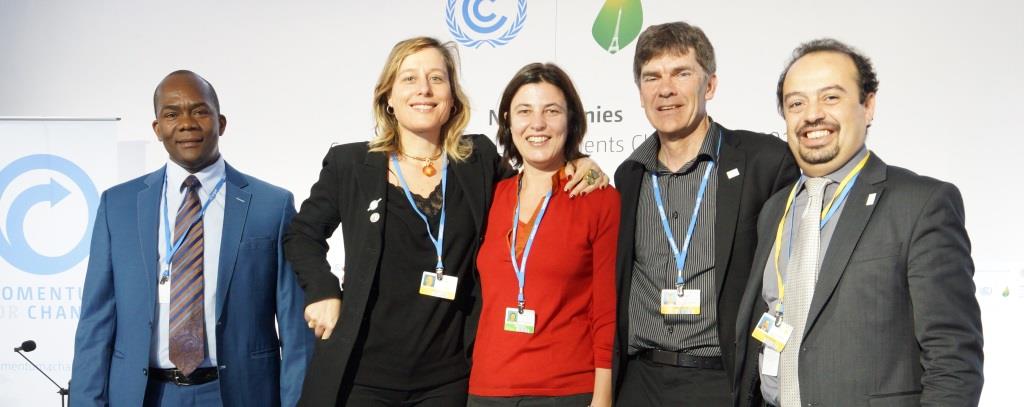What does citizen-based climate action look like? Ask Jakarta’s religious leaders
Climate commitments don’t simply fall out of the sky – successful climate action requires awareness raising, coalition building and buy-in and commitment from stakeholders at all levels.
That is why the Ambitious City Promises project has focused on bottom-up models of climate action, supporting local governments in Indonesia, Vietnam and the Philippines to pivot away from tokenism towards valuing stakeholders. Ultimately, each city that engaged in citizen engagement through Ambitious City Promises is working to co-create a future that reflects the needs and realities of people on the ground.
What does value-laden stakeholder engagement mean?
There are three key principles of stakeholder engagement that guided Jakarta, Hanoi and Pasig City through the process of engaging with stakeholders – through surveys and public consultations – and led them to develop tailored engagement platforms that fit the needs of their diverse communities. Here they are:
- Stakeholders are equal co-creators of knowledge and practice. Community support and engagement is key to local climate governance, and should be institutionalized to develop and meet climate targets. For example, in Hanoi, consultations with Civil Society Organizations and NGOs has led to a more holistic, integrated climate action approach. Co-designing a public space in Nghia Tan community center in Hanoi with the local community allowed stakeholders to align it with their needs, producing a recycled playground.
- Engagement methods must consider stakeholders’ preferences and limitations, and design activities with respect to local context. Stakeholders need multiple touchpoints with their local representatives, and feedback mechanisms must incorporate these considerations. For example, public consultations in Pasig City particularly aimed to empower marginalized communities. One disability rights leader felt this engagement allowed his sector’s voice to be valuably incorporated into policy.
- Relationships with climate justice must become tangible. The Paris Agreement, while useful in creating a collective global goal, can be too distant for stakeholders to consider how they can help. ACP set paths to empowerment by giving stakeholders access to climate justice narratives by amplifying stakeholders’ voices, making climate justice connections clearer, and co-creating climate action goals that align with daily realities.
The story of Jakarta’s interfaith collaboration
Nowhere are these principles of engagement more prominently on display than in the religious community in Jakarta. Through the Ambitious City Promises project, Jakarta’s faith leaders have united to fight climate change. ICLEI coordinated an interfaith coalition among Jakarta’s six main religious groups ‒ Islam, Protestantism, Catholicism, Hinduism, Buddhism and Confucianism ‒ to help raise awareness about climate change and create support for climate and sustainability action.
For many Jakartans, spirituality inspires them to live more sustainably and the interfaith coalition, made up of religious leaders from each main group, committed to bringing the message of environmentalism to their congregations.

Dr. Hayu Prabowo, a representative of the interfaith coalition, commented on the role of religion in tackling the climate crisis: “Climate action requires a multidisciplinary approach, not just collaboration with local and national governments, but also religious leaders. Why? Science and policy are very important, but they are not enough. What matters is the change in behavior.”
ICLEI worked with the interfaith coalition to publish a series of guidebooks tackling the role of their faith in climate crisis prevention. These books provide insights as well as holistic solutions for the sustainability of human life, sourced both from scripture and environmental studies. These Bahasa language guidebooks are references for the spiritual community about religious teachings on environment and climate change, eco-friendly worship, and how congregations can engage in behavioral change and adopt sustainable lifestyles in line with their faith. The series includes:
- A Religious Perspective on Humans and Climate Change which contains the efforts of the six religions in guiding their people to protect and preserve the Earth from the threat of damage, and includes proposed mitigation solutions.
- A guide on Eco-Worship Building that details how places of worship can function not only as places of spiritual guidance, but also as incubators of climate action movements.
- An Eco-Preaching guide for Islam, Catholic, Protestant, Buddhist, Hindu, and Confucian preachers that collects religious sermon material guiding them in treating the earth, water, land, and air, as well as addressing issues of climate and environmental crises in the daily lives of their faithful.

Lastly, to ensure that the contents of the books are broadcasted on the widest scale possible, religious leaders and preachers were invited to participate in various Training of Trainers activities from March 2020 to February 2021.
What’s next?
The mechanisms of stakeholder engagement that have been adopted in Jakarta, Hanoi and Pasig City through the Ambitious City Promises project have begun a critical shift in how local governments conduct engagement processes.
Stakeholder engagement should always be a core activity, and urban development should always be people-centric. Bottom-up communication allows for a better understanding of a city’s context, history, interests, and needs, which drives people-centric and needs-based implementation. Proposed policies should undergo a robust and transparent stakeholder engagement process, one that provides stakeholders access to a range of engagement mechanisms with their representatives. Feedback mechanisms should consider the public’s limitations, be responsive, and, to the extent possible, capable of addressing stakeholders’ questions or concerns.
While technical climate action is critically important, stakeholder engagement gives meaning to numbers and graphs. Stakeholders must understand what goals mean and why local climate action is relevant to their daily lives. Inspiring stakeholders’ active support and cooperation starts by creating a collective understanding and appreciation of what the city wants to achieve and the role that the stakeholders play in their low emission development journey.
—
Ambitious City Promises is implemented by ICLEI – Local Governments for Sustainability and funded by the German Federal Ministry for the Environment, Nature Conservation and Nuclear Safety (BMU) through the International Climate Initiative (IKI).





